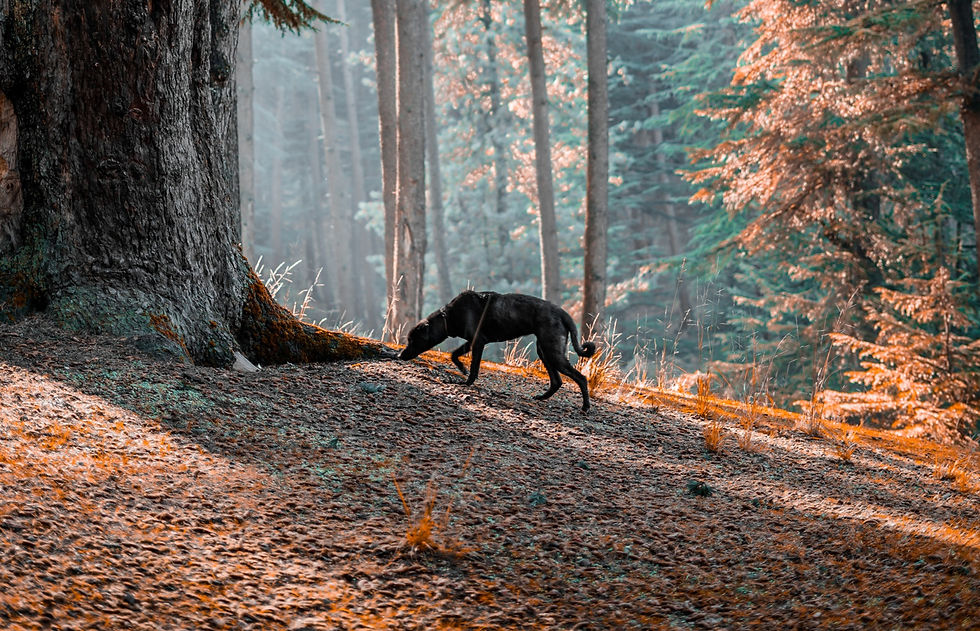Decoding Dog Sniffing: The Canine Superpower
- Jess Barber

- Sep 11, 2023
- 3 min read
Have you ever wondered why dogs are so captivated by the world of smells? A dog's sense of smell is nothing short of extraordinary, and sniffing plays a pivotal role in their lives. In this article, we'll dive into the fascinating world of sniffing for dogs, exploring the science behind their extraordinary olfactory abilities, the many purposes of sniffing, and how you can enrich your dog's life by embracing their natural instinct to explore through their nose.

The Remarkable Sense of Smell
Dogs' noses are truly remarkable. In fact, their sense of smell is estimated to be between 10,000 and 100,000 times more sensitive than that of humans. This incredible ability is due to the presence of approximately 300 million olfactory receptors in a dog's nose, compared to about 5-6 million in humans. The portion of a dog's brain dedicated to analysing smells is also substantially larger than ours.
The Science Behind It
When a dog sniffs, they're doing more than just inhaling scents. Their noses have two distinct air passages that allow them to both inhale and exhale simultaneously. This continuous circulation of air enhances their ability to detect and analyse scents effectively.
A dog's nose is also equipped with a moist layer that helps capture scent molecules. Specialized receptor cells then send these scent messages to the brain for processing. This complex system enables dogs to differentiate between an astounding array of smells, making them exceptional trackers, search-and-rescue dogs, and even able to detect medical conditions.

The Many Purposes of Sniffing
For dogs, sniffing has various functions:
Exploration: Dogs use their sense of smell to explore their environment. Every blade of grass, tree, or lamppost holds a treasure trove of scents that tell them stories about the world around them.
Communication: Dogs communicate with one another through scent. They can detect another dog's age, sex, and emotional state through scent markings left behind.
Hunting and Foraging: In the wild, a dog's sense of smell is essential for locating food. Domestic dogs often display this behaviour during games of hide-and-seek or when trying to find hidden treats.

Enriching Your Dog's Life
Understanding the importance of sniffing in a dog's life can help you enrich their daily experiences:
Allow Time for Sniffing: During walks, let your dog stop and sniff as much as they want. It's a form of mental stimulation that can be just as tiring as physical exercise. Vary walks, covering different surfaces and environments. If you watch your dog closely you might be surprised by just how much sniffing they are doing!
Scent Games: Engage your dog in scent-based games, like hide-and-seek with treats or toys, to challenge their mind and build their scenting skills. Consider scatter-feeding by tossing treats or their meals into the grass and watch their nose skills in action!
Scentwork Training: Consider trying out scentwork or mantrailing with your dog to allow them to harness their natural abilities and use their canine instincts.
Scent Toys: Use puzzle toys or treat-dispensing toys to encourage your dog to use their nose and problem-solving skills.
Novel Scents: Consider introducing your dog to items with scents they might not have experienced before. For example, bring back some sand or a few shells from a trip to the beach, or a piece of wool from a visit to the farm and allow your dog to investigate them with their nose.
Introductions: Bringing a new pet home? It can help to make things smell familiar. Breeders will often send puppies home with a toy or blanket that smells of their Mum and siblings to ease the transition to their new home. If you have a resident dog and are introducing a new pet, consider allowing them to explore eachothers' scent before first meeting to allow a feeling of familiarity.
A dog's sense of smell really is a superpower to be embraced! By allowing your dog the time and space to explore the world through their nose, you not only enrich their lives but also strengthen the bond between you. So, the next time your furry friend stops to sniff that patch of grass or investigate a seemingly insignificant spot, remember that that sniffing is their primary means of exploration and vital for their wellbeing. Allow them to stop and smell the roses... or patch of pee!




Comments